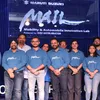Cash, Competency, and Connects: how India Accelerator has supported 65 startups across 5 cohorts
India Accelerator is the only programme in India backed by the Global Accelerator Network (GAN). Its founder Ashish Bhatia explains how it works.
[This article is part of Startup Hatch, a series launched in 2013 by YourStory featuring incubators, accelerators, makerspaces, and coworking spaces in the startup ecosystem. See earlier profiles of initiatives at IIT Bombay, IIM Bangalore, BITS Pilani, NCL, Tata Elxsi, Axilor, NID, IIIT-Bangalore, IIIT-Hyderabad, Vellore Institute of Technology, PSG Coimbatore, Electropreneur Park, Workbench Projects, Makers Asylum, NetApp Excellerator, TechStars, Indigram Labs, WeWork, Z Nation Lab, Sandbox Startups, Brigade REAP, Target India Accelerator, Maersk, Anthill Studio, UnternehmerTUM, AZO, EXIST, InsurTech Hub Munich, Afthonia Lab, Supreme Incubator, IISC-SID, CoWorks Foundry, and Ashoka Innovators.]
Ashish Bhatia is the Founder of India Accelerator, with over 25 years in leadership positions at reputed MNCs followed by a successful stint in helping build the startup ecosystem. He has worn multiple hats as an entrepreneur, investor, and mentor.
He earlier worked at Fidelity, United Health Group, and American Tower, and founded OrganIQ Consulting. He studied at National Institute of Technology (Kurukshetra) and Management Development Institute.
In an interview with YourStory, Ashish talks about the vision, achievements and future plans of India Accelerator, along with giving words of advice for aspiring founders.
Edited excerpts of the interview:
YourStory [YS]: What was the founding vision of India Accelerator, and how is it supported?
Ashish Bhatia [AB]: It is estimated that over 90 percent of startups fail. While the US has an evolved startup ecosystem with accelerators like Y Combinator churning out success after success, not many opportunities exist in India to help grow early-stage entrepreneurs through a structured and well-managed angel investment and acceleration process.
There are only two ways to make money in startups. One is to create something valuable, and the other is to invest in and back those people who are creating something valuable.
We realised very early on that we belong to the latter category, so India Accelerator was started with an idea to achieve both a financial return and a positive economic and social impact. The guiding principle is to actively pursue positive change in the startup ecosystem while creating wealth for everyone.
Our vision is to be the ‘Accelerator of Choice’ for startups.
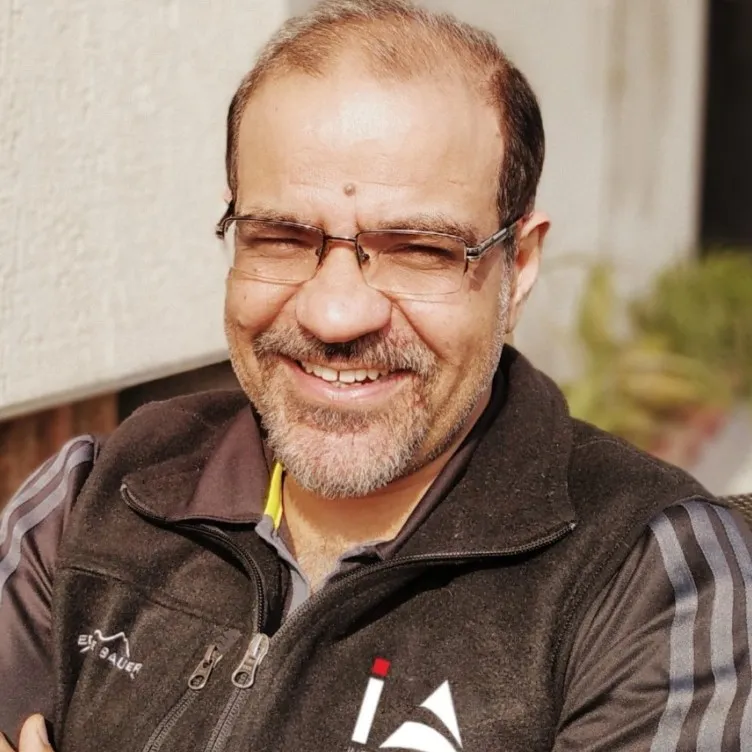
Ashish Bhatia, India Accelerator
[YS]: What would you say are the opportunities opening up for Indian entrepreneurs?
[AB]: The young Indian minds are full of innovative ideas. Those who are willing to come up with solution-based concepts successfully seize the market opportunities for continued business success. However, to make that certain, Indian entrepreneurs are leveraging the adoption of technology for market acquisition and business scalability.
Startups are addressing the need for innovation in the market and accomplishing it through technological change. Additionally, the improvement in the adoption of digital infrastructure is paving the way for startups to acquire customers at a reduced cost, thereby increasing the overall operational efficiency.
The present market scenario has increasingly become uncertain, and large established companies face challenges to innovate. This becomes a barrier to their business growth as relying on internally generated knowledge does not prove to be beneficial for them. Thus, there is a huge opportunity for Indian entrepreneurs to benefit the already established corporates in the market with their innovative products.
Additionally, the continued efforts by the government to recognise the startups as important contributors to economic growth is creating a huge opportunity for Indian entrepreneurs to disrupt the market. The flagship initiatives, Startup India and Atmaanirbhar Bharat for startups are building a strong ecosystem for driving sustainable startup growth.
[YS]: What are the key challenges faced by startups in India, and how can you help bridge the gap?
[AB]: In India, the opportunities for the startups are immense, but so are the challenges. The present market scenario possesses a certain number of obstacles for the Indian business environment that makes it harsh for startups to scale up. Right from the initial stage, Indian startups face huge challenges in setting up and building the business. Scaling of business requires a timely infusion of capital and availability of finance is a huge issue.
The second big challenge the startups face is finding the right revenue channels to fuel their growth. While this pandemic has brought the focus back to unit economics for a startup, many of them still struggle to find the right balance between business scalability and scalability of their unit economics.
Another big challenge for a startup is a lack of mentorship. Running the startup is like a puzzle with multiple pieces that need to fit together to make a beautiful picture. Most founders have great ideas or excellent technology but have little or no industry, business and market experience. That’s where mentors can add tremendous value to the trajectory of a startup.
Last but not the least, hiring the right kind of talent. The initial team for a startup can make or break the startup. To find and hire the right kind of talent for the business with skills to match growing customer expectations are one of the biggest challenges.
In such a context, an accelerator is an entity which selects only the best of early-stage startups and works closely with them to grow them into successful ventures. India Accelerator (IA), a leading seed-stage technology Accelerator in India, based out of Gurugram, is the only programme in India backed by Global Accelerator Network.
Its unrelenting focus during the four-month cohort is to provide its startups massive growth through its mentorship, IA-Masters (CXO network), technological and peripheral services (legal, hiring, GTM) and finally, a platform to raise funding from investors.
[YS]: How has the COVID-19 pandemic affected your operations? How are you responding to the crisis?
[AB]: The COVID-19 pandemic posed unprecedented challenges for the startup ecosystem of India. The accelerators have been equally impacted, which called for quick pivots, much like the startups we accelerate. Our 16-weeks physical programme was an extremely hands-on, rigorous engagement with the startups working out of our coworking space.
In wake of the pandemic, we have revamped our accelerator programme to make it completely virtual, while also maintaining the close-touch approach. All sessions, workshops, deep-dives and office hours are being conducted online, thus helping us expand our scope to remotely located startups as well.
We have also changed the format from a cohort-based structure, where we were typically running two cohorts in a year, to ‘rolling application’, which would enable us to support and help a lot more startups through an extremely customised and strategic intervention programme.
As they say, never let a crisis go waste – we are trying to make the most of it!
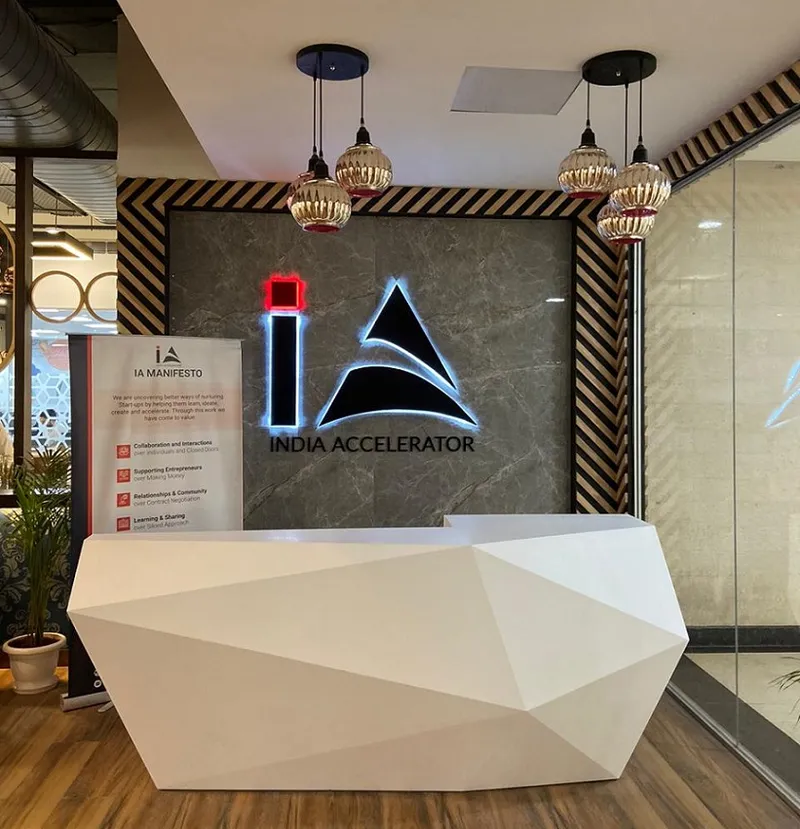
[YS]: What are the unique challenges for social entrepreneurs as compared to tech/business enterprises?
[AB]: As much as ‘startup founder’ is glamorised, the journey is far from being easy. Founders are challenged to keep their belief and vision intact against various odds on an everyday basis, more so for social entrepreneurs because they tend to automatically also indulge in a moral commitment towards creating a positive impact!
The biggest challenge that looms over social entrepreneurs is the persistence of the social impact-profitability dichotomy. Organically-grown, ethically-made or handcrafted products are a lot dearer in terms of price as compared to the traditional assembly line production. And given how price-sensitive India as a market is, the products don’t necessarily catch the fancy of the Indian consumers.
Scalability is another big challenge for social ventures. The premise of most of these ventures is the empowerment of localised groups, sections or strata of society or addressing social issues by harnessing local resources, which then make it extremely challenging to scale it up to the next level of growth. Since these ventures are not able to showcase the exponential growth a typical tech startup is expected to achieve, the investment sentiment of regular investors and VCs in social space is not always favourable.
Having said that, there is a lot that’s being done in the social space and the situation is changing for the better with an increasing number of impact investors supporting these entrepreneurs in their mission.
[YS]: What support and services do startups receive in your accelerator?
[AB]: The growth of any startup relies on access to funds, strategic partnerships, customer acquisition, and many more. Curating all necessary ingredients is extremely critical, especially when the founder is not a serial entrepreneur. India Accelerator is India’s one and only Global Accelerator Partner (GAN) backed institution that has exclusively designed programs, curated with mentorship and connections that a growth-stage startup requires along with global access.
This exclusive programme helps startups to move beyond the startup phase by equipping them with the knowledge, tools, and connections needed for their next stage of growth. Focus is on serious acceleration and the programme is designed to support and navigate startups through the process of operationally scaling their business while generating meaningful relationships with IA Partners, mentors, and investors.
Successful founders and corporate CXOs (IA Masters) from across the community spread across the globe will be the primary mentors for the program.
Furthermore, we have immense support from our network of 500+ angel investors – the iAngels. Network members are collectively committed to contributing money and their time and expertise in startups, and also to provide the entrepreneurs access to their networks.
Being a founder can be a lonely and tough experience. No matter what stage you’re at in your business, joining a group of founders who meets regularly to support each other’s entrepreneurial ventures is one of the best things you can do for your company. With that philosophy, IA is committed to keeping building the founder’s family.
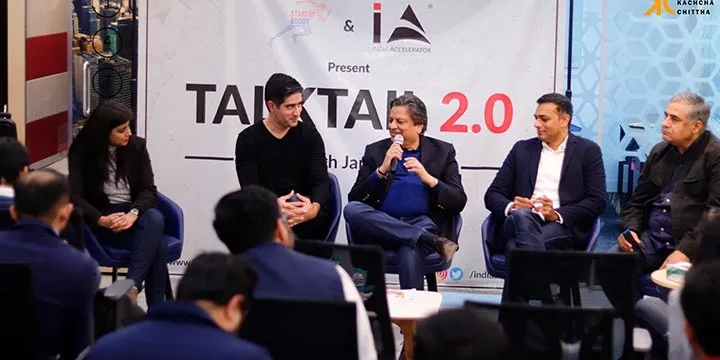
IA event
[YS]: How many cohorts have you had, and how many startups have graduated?
[AB]: We have had successful completion of five cohorts where each cohort is a 16-week structured programme aimed at expediting startups’ growth by providing them with the right guidance and push needed.
In view of the pandemic, the format has changed to ‘rolling applications’ where we receive hundreds of applications every month, of which only four to five make it to the final selections. Our portfolio consists of over 65 startups.
[YS]: What are some notable startups who have graduated from your accelerator, and what are their achievements?
[AB]: The success of the startups depends a lot on how well the founders are able to leverage our ecosystem to get to the next orbit of growth. Multiple startups have done that effectively and are growing from strength to strength.
Prithvi.AI, part of our third cohort, is cultivating global AI innovation on a single platform. Loc8, the Geospatial Intelligence Platform of Algo8 and Prithvi.AI, has been acquired to Create DeepSpatial Inc, which is a public company now on the Canadian Securities Exchange.
, part of our 2nd cohort, has been achieving 100 percent MoM growth in 2020, despite the pandemic. Galaxy Card was also featured in Mint's list of 'Five fin-tech startups to watch out in 2021!'
, a Cohort 2 startup, which started as a discovery platform for legal professionals, has now expanded to over 1,500 cities in the country with a subscriber base of over 2,000. During COVID-19, they expanded their offerings to law students. They have beta launched Law-Ed, which is an e-learning platform for law students and legal professionals with unique offerings.
[YS]: What is the profile of the managers of your accelerator?
[AB]: I am ably assisted by Mona Singh, Co-Founder at India Accelerator. She is focused on seed-stage investments. She has worked intensively with entrepreneurs to build transformative companies that improve the way we live, work and connect.
With over 16 years of rich experience in MNCs, with technology at the core, Mona brings the large enterprise strengths to the startups to ensure a well-rounded perspective on successful business models, brand building and consumer trends.
[YS]: What are the selection criteria for startups in your accelerator?
[AB]: While we have changed formats to extend our ecosystem to a larger number of startups across the country, our acceptance criteria still is extremely stringent with only 4-5 percent making the final cut.
A major criterion for us when we select a new startup is the quality of founders. Entrepreneurship is tough work, so founders need to be exceptional for the startup to have any chance of success. The due diligence process is broadly based on two principles – wide search and high-quality filters.
Better, faster, cheaper – their products must fulfil any two of these criteria. Investors look at the go-to-market strategies for achieving scale with a self-sustaining business model. So, the ability to execute at pace and in scale has to be the core of the business model.
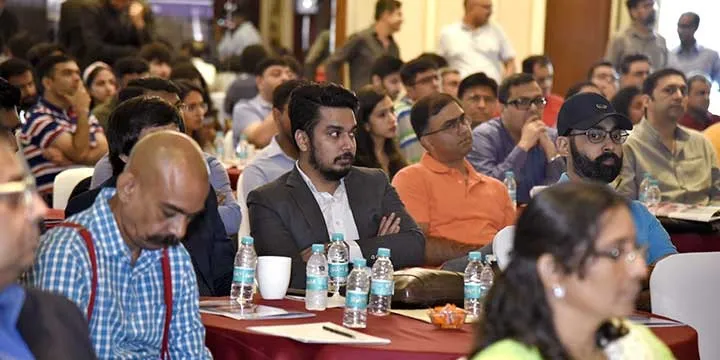
IA Event (2)
[YS]: Who are some of your institutional partners, and what kinds of agreements are in place?
[AB]: The vision that we have set for ourselves in this journey is not an easy one. We want to be instrumental in fostering a vibrant digital entrepreneurial ecosystem for India at large.
It’s a vision that can’t be realised in silos, we need to join forces to create an inclusive and comprehensive ecosystem. In this endeavour, we have partnered with various entities and organisations across the spectrum to build a platform which is like a one-stop-shop for startups.
In the social space, we have tied up with United Nations Technology Innovations Lab (UNTIL) and African-Asian Rural Development Organization (AARDO). Through this partnership, IA sets out to strengthen startups doing groundbreaking work with the use of technology focusing on the Sustainable Development Goals of the United Nations and work with member countries of AARDO in the Afro-Asian region.
IA’s partnership with Biotechnology Industry Research Assistance Council (BIRAC) is to stimulate, foster and enhance the strategic research and innovation capabilities of the Indian biotech industry, particularly startups and SMEs, for creation of affordable products addressing the needs of the largest section of society
We are actively working with universities as well where we have tied-up with the IITs and NITs to strengthen the on-campus Entrepreneurship Programme.
[YS]: What percentage of equity or what fees do you charge your startups?
[AB]: We don’t charge any fees to the companies to be part of the IA Programme. Once we invest, we’re motivated to help companies succeed by introducing them to people who can help, assisting with strategy, building technology, refining thought processes, finding more investors, and generally helping win all along their entrepreneurial journey.
We are in this with the startups for the long haul. IA wants to be viewed as a co-founder. Hence, for us to have our skin-in-the-game, there is small single digit equity that helps us to tie our growth to that of the startup.
[YS]: How would you differentiate your accelerator from the other accelerators in the field?
[AB]: IA’s differentiation is its intensive hands-on approach, 360 degrees’ coverage, investor relationships, partner network, and its global focus. Our mentors are all senior successful people who have the passion to build the entrepreneurship community.
We are the only GAN (Global Accelerator Network)-backed accelerator in India, which is one major point of differentiation. GAN opens up numerous opportunities for our portfolio startups to expand globally, and also brings global mentorship and investment into the picture.
Secondly, our value proposition for startups which is spread across three distinct horizons – Cash, Competency and Connects, is very uniquely curated as an umbrella offering and is moulded in accordance to the needs of each individual startup which we take on board.
We realise that each startup is unique to its solution, and hence pay a lot of emphasis on providing targeted and focused guidance to all our startups.
[YS]: What are your plans for the coming three to five years with respect to new startups?
[AB]: India Accelerator is a robust accelerator using global knowledge and local experience. It has created a proposition with a world class Infrastructure and dynamic knowledge kernel.
It has adopted a gradual growth curve while keeping scale-up ambitions intact considering current ecosystem maturity, mortality reasons and supply constraints supply. India Accelerator carefully steered from solving supply constraints and focusing on funnelling, mentoring, and networking.
Going forward IA will have more diversification of its offerings, more global reach, across more countries and also would participate more at later stages. Also to the original vision of setting up IA, contrary to the belief of cutting losses to focus on winners, we would want to use our resources to continue helping entrepreneurs who are struggling as well.
We would want our India accelerator-backed company to go public in the next few years. That is the internal benchmark we have set for us.
[YS]: What would you define as success for your accelerator?
[AB]: With IA’s rapid growth and increased mentorship, we would want to reach the state where a significant part of companies who raise Series A are those who come from IA. What started off as an accelerator programme alone should expand to an accelerator-backed committed venture fund spread across multiple geographies.
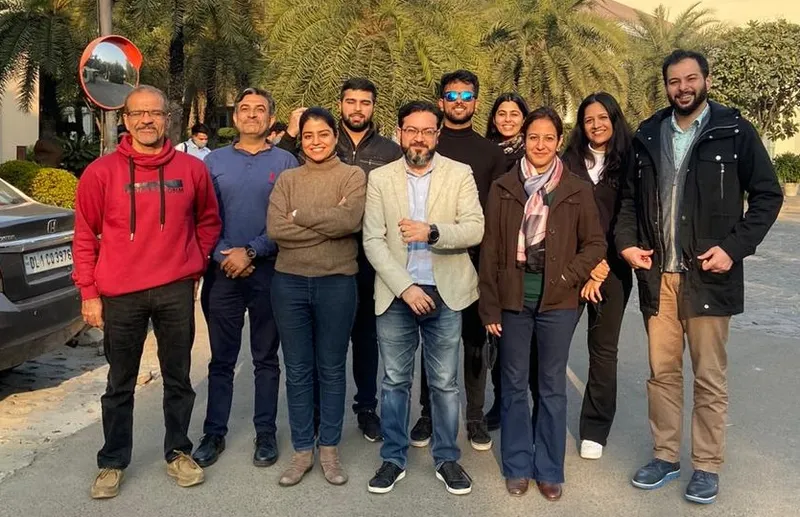
Team IA
[YS]: What are the challenges you face, and how can they be overcome?
[AB]: The industry faced a massive slump during the pandemic led lockdown. The year 2020 has undoubtedly laid down exacting standards for startups to emerge amid the market uncertainties. The pandemic induced lockdown brought all business sectors close to a grinding halt.
Initially, there were setbacks due to stay-at-home orders including a massive dip in the funding of the startups. With the economy reopening, the segment is gradually picking up the pace and coming back on track of the pre-COVID levels.
Considering the potential of Indian startups, the entire ecosystem is optimistic about its growth trajectory. The radical shift in digital adoption is set and will continue to drive sectors such as education, healthcare, and commerce.
[YS]: How can better partnerships be forged between accelerators, industry and universities?
[AB]: As they say, it takes a village to raise a child – similarly it takes a nation to provide the necessary resources, infrastructure, policies and system to make a startup successful. All entities, right from universities and accelerators to corporates and government bodies need to work in collaboration to create an ecosystem which is conducive for sustained growth of startups.
We need to create a constructive framework for a robust academia-industry connect. Collaboration with industry is critical for academia to create scientific knowledge and obtain industrial data. In this pursuit, we are actively working with Institutes as well as Corporates to bring the best from the two critical pillars of our economy.
As part of such corporate innovation programmes, we conduct Design Thinking workshops with the corporates to help them identify the pain points in their processes. These pain points are provided to the students from the universities that we have tied up with.
The teams work on these real-life problem statements that help them to apply their knowledge and learning which eventually evolve into real-life solutions.
[YS]: What are your recommendations for Indian policymakers to make business easier for accelerators, investors, researchers and startups in India?
[AB]: Do not force-fit a model to all incubators. The government should allow each incubator to evolve their own model on the basis of the startup model. This includes incubation period, infrastructure support, and technical and business mentoring. The government should also provide some relaxation in tax.
[YS]: What are your recommendations or words of inspiration to the startups and entrepreneurs in our audience?
[AB]: Keep on contemplating new ideas, be innovative and bring out the best in your industry. And always ready to explore new things.
[YS]: Which startups are currently being accelerated?
[AB]: Here are the startups in our Winter 2020 Cohort, along with brief descriptions and founder names.
Eco Impulse (founded by Akshat Vyas) provides solutions for renewable energy generation. Its products include SCR-01, a solar panel cleaning robot. It cleans solar panels without using a single drop of water.
AI Mage (founded by Shreyas Jagannath and Prashanth Simha) has developed solutions based on AI, AR and VR technologies to personalise the online shopping experience. It enables Virtual Try-on for clothes and accessories, along with a recommendation engine.
Nature's Tattva (founded by Karnesh Mahendru and Megha Wadhwa) is a DIY Beauty brand. It provides users with the raw material along with DIY tutorials on making their own cosmetics in preferred batch sizes, suited to their skin and hair type.
Seclogic (founded by Mayank Lau) offers cyber-security adoption roadmaps for CXOs. It includes cloud security, people assessment, simulation and training. It is a member of established internet security organisations with recognised best practices.
Prophaze (founded by Vaisakh Rajeevan) helps secure Kubernetes deployments with reduced complexity and shorter learning curves. The service protects web assets from cyber threats, bots, attacks, misconfiguration, and patch vulnerabilities, in infrastructure and third-party apps.
AtServe (founded by Nitesh Bhardwaj) is a door-step water service solution for vendors to manage customers, orders, feedbacks and sales. Customers can reach out for services from local vendors which are cost-effective and professional.
Empryts (founded by Deepak Kumar) enhances employee rights with job security services. It supports, represents and guides employees in job-related issues. It offers services for risk management, an audit of critical documents, and legal support. Targeted issues include unlawful discrimination, harassment, and layoffs.
Pushlytics (founded by Tapan Kane and team) offers comprehensive data collection and structured processes for business analytics. Companies can clearly understand their users, make data-driven decisions, and craft better digital experiences.
Arivihan (founded by Ritesh Singh) provides affordable and personalised coaching to K-11 and K-12 students. It uses AI for adaptive solutions that improve the learning journey according to student’s own competence.
Lfyd (founded by Satyajeet Pathnayak) is a hyperlocal discovery startup that helps customers with the information on best deals, offers, sales and cashbacks. It also helps clients with business developments.
The Story Boxx (founded by Vistasp Bhagwagar and team) is a marketplace for designers. It is positioned as the ‘Swiggy of the material sampling industry,’ connecting designers to high-quality material vendors.
Sportoze (founded by Pradeep Parashar and team) provides professional training and coaching in sports. Its consultants leverage customised algorithms to improve fitness and performance. There are regular training programmes, sports events and camps.
mHealth.ai (founded by Rajesh Munjal) is an AI-powered integrated digital wellness platform for B2B customers. It connects healthcare experts, customers and corporates, with digital solutions and transactions.
HighIQ (founded by Rajeev Agarwal and Arvind Agarwal) is a content creating a platform with entertainment solutions for millennials and Gen-Z users. Relatable curated content is drawn from domains including entertainment, lifestyle tips, food recipes and music. They have over 6 lakh subscribers on YouTube, as well as 4.5 lakhs on Facebook and 35,000 followers on Instagram.
[YS]: Which startups have already graduated from India Accelerator?
AB: Here are the startups classified by cohort, along with description and founder names.
Winter 2017 Cohort
CabBazar (founded by Amit Dhall) is a taxi ‘aggregator’ with user-friendly real-time booking services. Journeys can be made with one-way and round-trip cabs from various travel agencies and drivers.
Kuants (founded by Ayush Gangwar) is an algo trading startup with strategies for live markets.
Summer 2018 Cohort
Samadhan (founded by Deepak Uniyal) is a grievance redressal platform for insurance policyholders, covering fraud selling and claim settlement.
Lawyered (founded by Himanshu Gupta) is a discovery platform connecting corporate lawyers to businesses and SMEs. It helps clients decode law requirements and contact reputed and reliable legal professionals.
Galaxy Card (founded by Amit Kumar) is a mobile-based instant credit card solution, which lets users make their first purchase in just minutes, without having to upload any documents.
Compport (founded by Rakesh Saoji) provides flexibility and intelligence in the rewards management design and decision making, processes.
Spring 2019 Cohort
VAPP (founded by Piyush Soneja) is a VR/AR platform for the real estate and tourism industry. It helps provide immersive and authentic experiences
.
Charitism (founded by Sudhanshu Sharma) is an online fundraising platform for charities and critical causes. Contributions can be made during e-commerce activities.
FIO (founded by Robby Rawat) is an entertainment hub with self-conceptualised events (IP-owned) focused on fashion, lifestyle and entertainment. It is a B2B marketplace for young designers and millennial audiences.
Search Bot (founded by Pratik Sharma) is an AI-based search intelligence platform for effective advertising. It addresses concerns of uses and marketers.
Playtoome (founded by Keerthivasan Subramaniam) is a live entertainment destination which lets users watch concerts and live performances, such as dance, music, and drama.
DROR (founded by Dhiraj Naubhar) is a security solution for women, combing social networks and technology to create a safety network.
The Knotty Tales (founded by Rishi Chadha) is a complete wedding suite designed to curate a number of vendors on one platform. It helps make weddings hassle-free for hosts as well as guests.
Prithvi.ai (founded by Nandan Mishra) enables collaborative projects between government organisations, industrial partners, and educational institutes. It facilitates the sharing of resources and knowledge for accelerating R&D.
Winter 2019 Cohort
AS Technosolutions (founded by Anubhav Saxena) accepts card payments through scanning instead of swiping. The card can be scanned using the smartphone without any hardware attached to it.
My Game Mate (founded by Parshav Jain) aims to create next generation eSports athletes. Its multiplayer eSports platform targets mobile games in vernacular languages. It offers tournaments, leagues, streaming and a merchandise store.
(founded by Pramudit Somvanshi) is macro skill-based adaptive assessment solution for K-12 students. It identifies the student’s learning gap through various data points and knowledge mapping, and provides personalised homework facilities.
Kachcha Chittha (founded by Vinod Arya) is a modern day news channel, which has already garnered more than two million likes on Facebook and 1.6 million subscribers on YouTube.
Hypermine (founded by Irfan Khan) offers smart tools and protocols for identity, payment and security. The solutions are based on distributed systems, machine learning and public key cryptography.
Ubiqc (founded by Vinay Prakash) is a SaaS-based customer experience (CX) platform, which helps map the entire customer journey using a single shared app. It improves customer engagement and retention for big enterprises and SMBs.
Wardo (founded by Arjan Sahni) is a personalised fashion styling platform. It helps ecommerce shoppers with buying decisions and also aids stylists in increasing their efficiency using AI.
Dhurina (founded by Sachin Sardana) is an e-learning platform targeted at students in Tier 3 cities or rural areas. Teachers are connected to students at affordable rates. It has 400K+ users, in Haryana, Rajasthan and Madhya Pradesh.
Ingreens (founded by Tushar Talwar and Kunal Bhatia) is an indoor farming company focused on exotic greens. The vertical farms use precision farming techniques for customers in Chandigarh, Panchkula and Mohali.

Summer 2020 Cohort
GetWork (founded by Rahul Veerwal) is a placement platform for companies to hire college students, interns and fresh graduates. The two-way marketplace is targeted at colleges, companies and startups.
Horeca Stop (founded by Abhishek Garg) is a one-stop omnichannel procurement platform providing for the hospitality industry. It covers process automation, supply chain management, logistics, and sourcing.
MinzoIndia (founded by Hitesh Varyani) is a B2B footwear marketplace focused on quality and price. Workmen can directly sell their products online, and wholesalers and retailers can buy them at competitive prices.
FitBuddy (founded by Vikram Saigal) is a personalised training and monitoring app. It uses computer vision and deep learning algorithms for sports and fitness enthusiasts to improve their performance.
GameChest (founded by Anup Upendra) is a real money multiplayer gaming platform hosting contests across a plethora of game types. Its APIs enable third-party game developers to run contests for gamers on its apps.
(founded by Nandakishore Harikumar and team) is a big data cybersecurity startup. It tackles cyber threats, spreading of misinformation, privacy and data breaches, using AI.
Brainwired (founded by ShreeShankar Nair and Romeo Jerard) is an agri-tech startup developing a livestock health monitoring and tracking system, called WeStock. It enables data-driven decisions to improve profitability.
Answer Genomics (founded by Rahul Ranganathan and AR Balamurali) is building commercially viable genomic solutions. Its research helps prognose, diagnose, prevent and cure a range of lifestyle and clinical disorders. It builds on genomics, nutrition science, and physiology using machine learning.
Skinny Herbs (founded by Tushar Tiku) is a craft green tea brand which provides a go-to daily beverage for a growing health-conscious population. There are four variants: Anytime Teatox, The Oomph Factor, Power Refresh, and Classic Green.
Recycle.Green (founded by Hardik Shah) is an online marketplace selling recycled products. Categories include home decor, office and stationery, apparel, gifts, event essentials, and travel essentials.
Quali55Care (founded by Harddik Patel and Raj Manta) is an online platform providing durable medical equipment on rental and sales basis. The one-stop solutions are targeted for homes and hospitals.
Adya Lifecare (founded by Rabindra Mohpatra and Tanmay Sahu) is a healthcare aggregator for services such as doctors’ appointments, home care, telecare, remote monitoring, laboratory, pharmacy, medical equipment, ambulance and mobile clinics. It leverages technology to lower cost and improve efficiency.
Gateway VR (founded by Siddhant Mahajan) empowers interior designers and architects with products that can help create interior layouts in 2D, 3D and VR in real-time.
Hasora (founded by Asuka Hatta and Mai Hatta) provides Japanese organic groceries to customers in Gurgaon. T links health-conscious consumers with local farmers, and guarantees delivery of pesticide-free vegetables and fruits within 24 hours of harvest.
Edited by Kanishk Singh






